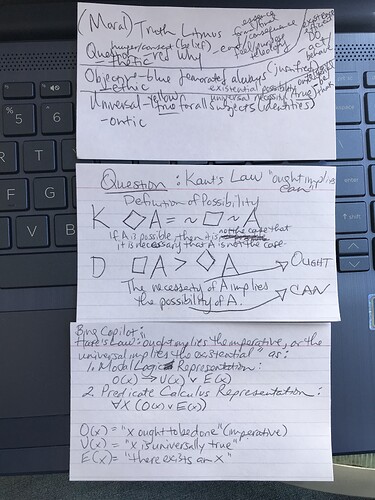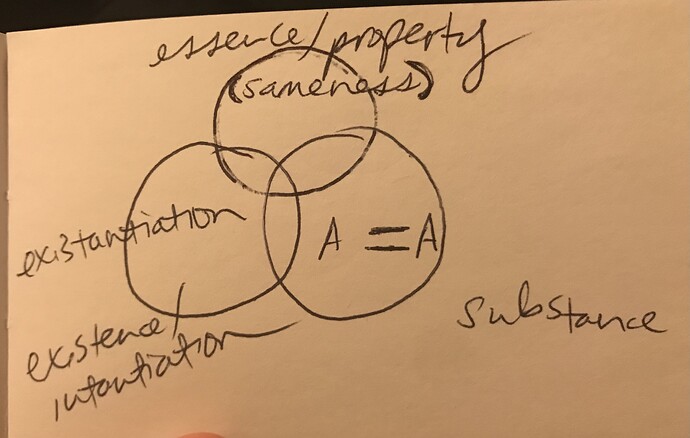Impossible? Impassable may be that limit, variable it is, almost infinitely, which the act of revising methodology squares off with it’s apparent counterpart - the near absolution of space/time, multi universes are like stars that no longer exist but still twinkle, , proof that even near any event horizon, the minutest gradient can sustain the whole structural colossus.
when i say impossible i mean something like a “symbol that refers to a referent that it does not refer to”.
O
this part of the second sentence above should say this instead.
"if something is possible, then its necessarily obtains in some possible world. "
edited the post above this because i didnt include the word “not”
i feel like if faust were here, he’d tell us that we were just parsing language and that none of this mattered but then i would tell him that what i think im doing is that i am trying to explain how i think an epistemology machine works
You don’t understand modal logic at its base.
It means that we can’t have an idea unless it actually exists. Because that would mean something comes from nothing. To refute it …
There is a plane of imagination where things don’t substantiate.
I have the power to simulate entire cosmoses simultaneously to seek the best outcome… they never came to be just because I can simulate them.
Imagine if you didn’t need to do trial and error because you imagined things right/beautiful/necessary (& thus possible) the first/meta time?
Anywhayz.
I just had a glorious chat with Bing Copilot about Kant’s ought implies can (the crux of graded absolutism) and Hare’s ought implies imperative (the crux of Kierkegaard’s Subjectivity is Truth)…
Some scribblies:
Question. What is the opposite of a modal collapse, when you keep the universal, particular, and properties distinguished, but they obtain in the same being/doing/ending (substance existing essence)?
poss nec A implies nec A doesn’t sound right. We’re making an illicit move from (only) possible the case to necessary the case. It’s possible that necessary that wood doesn’t burn implies that necessary that wood doesn’t burn???
poss nec A implies A also is also off (to me). It’s possible that necessary that humans need pumpkin implies humans need pumpkin.
I think it’s because that if a necessary thing is possible (if you can’t show that it is impossible) then it has to be possible in all possible worlds based on the fact that something that is necessary “is possible” (I’m saying that instead of “exists” because I have a firm definition of existence) in all possible worlds. Possible worlds are not necessarily actual, because they are like contingency plans or thought experiments (counterfactuals) which may never come to fruition. But in order to even have a contingency plan, you need to have the ground of all contingency, or the condition for the possibility of contingency, or the necessary being subsuming all contingent being.
So with wood burning… It is not a great-making property or quality. There’s nothing suggesting necessity about it. With the ontological argument, you only have to consider the great-making properties or qualities. Unless great-making qualities are necessary, and therefore instantiated, they don’t exist (they aren’t instantiated). Woodburning can exist without being necessary. But you could argue that it wouldn’t exist unless it existed in the necessary ground of all contingency.
Moreso if the wood is not consumed by the fire. ![]()
And if you go to smash the pumpkin and it doesn’t smash… well there’s another example. lol sigh
I’m going to push reply and then review my original post.
I seem to have forgotten all the logic that I’ve been studying.
Some formal definitions (I know of). For some proposition p
- p is necessarily true: The negation of p entails a contradiction
- p is possibly true: p doesn’t entail p contradiction
Perhaps we can extend these simple notions to nonpropositions such as wood and pumpkins:
- x is necessary: the absence of x would entail a contradiction
- x is possible: the presence of x doesn’t entail a contradiction
The second p should be an a, no?
neither does the absence of x, if it is merely possible (contingent)
So this means things could’ve been done differently. What is required is that things were/are done.
Do you have any further insight into the original post’s question?
Following up to my last reply. Does that mean p or its negation (previous: absence) does not entail a contradiction?
That is a funny outcome,… pushing/reciprocating the extension back up to the thing it extends.
To be… or not to be. You either are, or you aren’t.
But filling out of — or falling short of — capacity (change toward or away from essence… predicate stuff) is not an all or none thing.
Don’t you just need one actual with actuated possibility, and any counterfactuals outside actuality just be merely mental (empty abstracta), but past/future be unactuated (for us, except what is premixed in actuated/now/present) actuality? For God…he is omnitemporal. Alltimes actual/present. The premixed whole.
hiccup
¿is it called The Nothing, by any chance?
kicks you out of the classroom
Give me an example of a thing that isn’t there.
straight faces the situation
really

